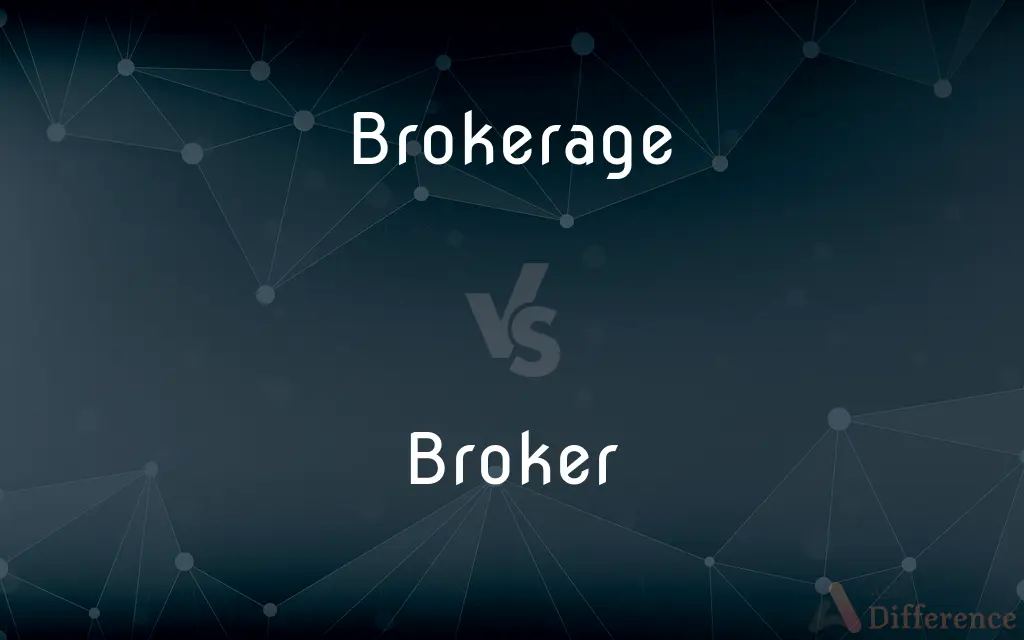Brokerage vs. Broker — What's the Difference?
By Fiza Rafique & Maham Liaqat — Updated on March 22, 2024
Brokerage refers to a firm that facilitates financial transactions, while a broker is an individual who acts as an intermediary in these transactions.

Difference Between Brokerage and Broker
Table of Contents
ADVERTISEMENT
Key Differences
A brokerage provides the platform and services for buying and selling securities, like stocks and bonds, whereas a broker is the professional who executes these transactions on behalf of clients.
Brokerage refers to the business entity or firm that offers trading services, while a broker is an individual who is licensed to trade securities and provide investment advice.
Brokerages often offer a range of financial services, including investment advice, portfolio management, and research. In contrast, brokers are focused on the execution of trades and may also offer personalized investment advice.
Brokerages are regulated entities that must comply with financial industry standards and regulations. Brokers, as individuals, must also be licensed and registered, typically with regulatory bodies like FINRA in the U.S.
Brokerage firms may interact with clients through various channels, including online platforms, physical offices, or through their brokers. Individual brokers work directly with clients, building personal relationships and understanding their investment goals.
ADVERTISEMENT
Comparison Chart
Definition
A firm that facilitates financial transactions
An individual who acts as an intermediary
Role
Provides platforms and services for trading
Executes trades and may offer investment advice
Entity Type
Business entity or firm
Individual professional
Services
Investment advice, management, research
Trade execution, possibly personalized advice
Regulation
Must comply with industry regulations
Must be licensed and registered
Client Interaction
Through platforms, offices, or brokers
Direct personal relationships
Compare with Definitions
Brokerage
A firm that acts as a middleman between buyers and sellers in financial transactions.
The brokerage handled a vast number of transactions daily on the stock market.
Broker
An individual licensed to buy and sell securities on behalf of clients.
The broker executed stock trades efficiently, maximizing client returns.
Brokerage
Often provides a variety of investment services and tools.
The online brokerage offered advanced trading platforms and educational resources.
Broker
May provide personalized investment advice.
Her broker provided insightful advice, tailoring her investment portfolio to her needs.
Brokerage
Subject to regulatory oversight and compliance.
The brokerage underwent an audit to ensure compliance with financial regulations.
Broker
Must adhere to ethical standards and regulatory requirements.
The broker attended regular training sessions to stay updated on regulatory changes.
Brokerage
May offer different types of accounts and fee structures.
Clients appreciated the brokerage's transparent fee structure and diverse account options.
Broker
Builds relationships with clients to understand their investment goals.
The broker's success was due in part to his dedication to understanding each client's unique financial situation.
Brokerage
Facilitates transactions in various financial markets.
The global brokerage facilitated trades in stocks, bonds, and commodities.
Broker
Acts as a representative of a brokerage firm.
As a broker for a reputable firm, he maintained high ethical standards in all transactions.
Brokerage
A firm that acts as a broker, especially in the buying and selling of stocks or other securities.
Broker
A broker is a person or firm who arranges transactions between a buyer and a seller for a commission when the deal is executed. A broker who also acts as a seller or as a buyer becomes a principal party to the deal.
Brokerage
The business of a broker.
Broker
One that acts as an agent for others, as in negotiating contracts, purchases, or sales in return for a fee or commission.
Brokerage
A fee or commission paid to a broker.
Broker
A stockbroker.
Brokerage
A business, firm, or company whose business is to act as a broker (e.g., stockbroker).
Broker
A power broker.
Brokerage
The occupation of being a broker.
Broker
To arrange or manage as a broker
Broker an agreement among opposing factions.
Brokerage
The commission paid to a broker.
Broker
A mediator between a buyer and seller.
Brokerage
The business or employment of a broker.
Broker
A stockbroker.
Brokerage
The fee, reward, or commission, given or changed for transacting business as a broker.
Broker
A mediator in general, one who liaises between two or more parties to attempt to achieve an outcome of some kind.
Brokerage
A stock broker's business; charges a fee to act as intermediary between buyer and seller
Broker
(computing) An agent involved in the exchange of messages or transactions.
Brokerage
The business of a broker; charges a fee to arrange a contract between two parties
Broker
(intransitive) To act as a broker; to mediate in a sale or transaction.
Brokerage
Place where a broker conducts his business
Broker
(transitive) To act as a broker in; to arrange or negotiate.
Broker
One who transacts business for another; an agent.
Broker
An agent employed to effect bargains and contracts, as a middleman or negotiator, between other persons, for a compensation commonly called brokerage. He takes no possession, as broker, of the subject matter of the negotiation. He generally contracts in the names of those who employ him, and not in his own.
Broker
A dealer in money, notes, bills of exchange, etc.
Broker
A dealer in secondhand goods.
Broker
A pimp or procurer.
Broker
A businessman who buys or sells for another in exchange for a commission
Broker
Act as a broker
Common Curiosities
How are brokers regulated?
Brokers are regulated by financial authorities and must be licensed to trade securities and offer investment advice, ensuring they meet ethical and professional standards.
What types of services do brokerages offer?
Brokerages offer a range of services including trade execution, investment advice, portfolio management, and financial research.
What is the role of technology in brokerage services?
Technology plays a significant role in brokerage services by providing advanced trading platforms, analytical tools, and access to real-time market data.
What are the ethical considerations for brokers?
Ethical considerations include maintaining client confidentiality, providing unbiased advice, and avoiding conflicts of interest.
What is the main role of a brokerage?
A brokerage's main role is to provide a platform and services for clients to buy and sell securities and other financial instruments.
Can brokers work independently of a brokerage?
While most brokers work for brokerages, some experienced professionals may operate independently, provided they comply with regulatory requirements.
How do brokerages ensure compliance with regulations?
Brokerages ensure compliance through internal audits, adhering to best practices, and keeping abreast of regulatory changes.
How do brokers keep up with market changes?
Brokers keep up with market changes through continuous education, market research, and leveraging analytical tools provided by their brokerage.
How does a broker differ from a brokerage?
A broker is an individual who executes trades and may offer investment advice, while a brokerage is the firm that employs brokers and provides the infrastructure for trading.
How do brokerage fees work?
Brokerage fees can vary, including transaction fees, management fees, and performance-based fees, depending on the services provided.
Can a brokerage offer services beyond trading?
Yes, many brokerages offer additional services like financial planning, tax advice, and retirement planning to cater to the broader financial needs of their clients.
What is the significance of client relationships in brokerage services?
Strong client relationships are crucial in brokerage services as they help brokers understand client needs, leading to better investment decisions and client satisfaction.
What is the difference between a full-service and a discount brokerage?
A full-service brokerage offers a wide range of financial services and personalized advice, whereas a discount brokerage provides basic trading services at lower costs.
What is the process for becoming a licensed broker?
Becoming a licensed broker typically involves completing educational requirements, passing licensing exams, and registering with regulatory bodies.
How can clients choose the right brokerage?
Clients can choose the right brokerage based on their investment needs, the range of services offered, fee structures, and the brokerage's reputation and regulatory compliance.
Share Your Discovery

Previous Comparison
Rooky vs. Rookie
Next Comparison
Sen vs. YenAuthor Spotlight
Written by
Fiza RafiqueFiza Rafique is a skilled content writer at AskDifference.com, where she meticulously refines and enhances written pieces. Drawing from her vast editorial expertise, Fiza ensures clarity, accuracy, and precision in every article. Passionate about language, she continually seeks to elevate the quality of content for readers worldwide.
Co-written by
Maham Liaqat













































